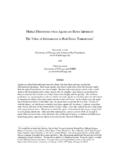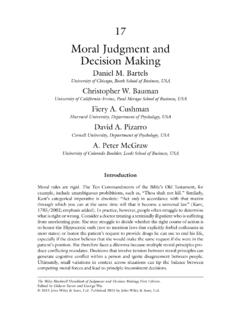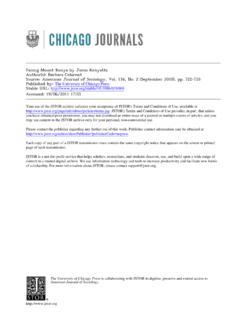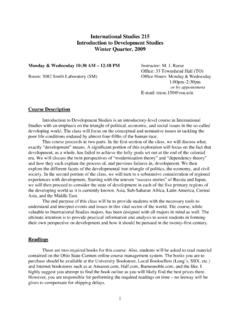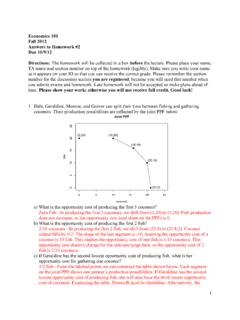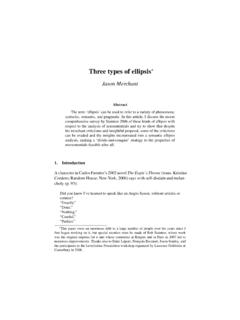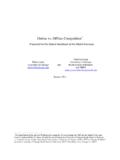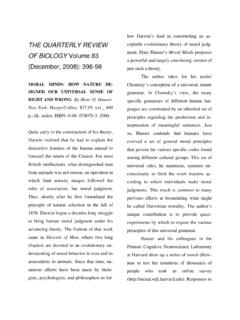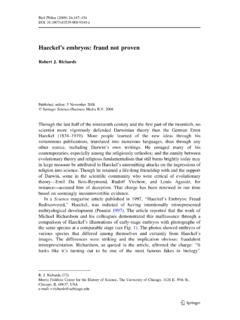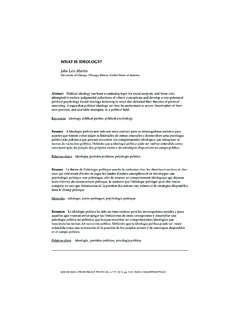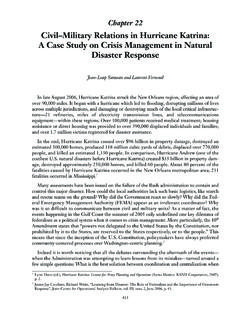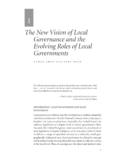Transcription of Federalism and Incentives for Success of Democracy
1 Quarterly Journal of Political Science, 2006, 1: 3 23 Federalism and Incentives for Successof DemocracyRoger B. MyersonDepartment of Economics, University of Chicago, 1126 East 59th Street, Chicago,IL 60637. E-mail: and failure of Democracy are interpreted as different equilibria of adynamic political game with cost of changing leadership and incomplete infor-mation about politicians virtue. Unitary Democracy can be frustrated when votersdo not replace corrupt leaders, because any new leader would probably also governcorruptly. However, federal Democracy cannot be consistently frustrated at bothnational and provincial levels, because provincial leaders who govern responsiblycould build reputations to become contenders for higher national office.
2 Simi-larly, Democracy cannot be consistently frustrated in a democratization processthat begins with decentralized provincial Democracy and only later introducesnationally elected in transition that have aimed for national elections as a first step (Bosnia forexample) have bogged down and generally handed power over to avatars of the old contrast, Kosovo and East Timor began with local elections, with a far better result ofbringing forward new talents and capabilities, and giving people a sense of Report on the Transition to Democracy in Iraq (2002, p. 24).This paper is a theoretical study of the problems of democratization. Our basic questionis how the chances of Success for a new Democracy may depend on the division of powersin its democratic constitution defines the rules of the game that politiciansmust play to win power and to use it.
3 With game-theoretic analysis, we can study theways in which a change of constitutional structure could affect the rational competitivebehavior of politicians. In this article, I analyze differences in the sets of equilibria thatare generated by some simple game models of unitary and federal Democracy . Our mainMS submitted 7 February 2005; final version received 28 August 2005 ISSN 1554-0626; DOI 2006 now show how the division of powers in a federal system can make a new democracymore likely to model to analyze the determinants of successful Democracy must be based on atheory of democratic failure. In particular, we need to understand why Democracy maybe particularly vulnerable when it is new, in a nation that is just emerging from anextended period of authoritarian rule.
4 We understand that a new Democracy cannotguarantee its Success simply by copying a constitutional structure that performs wellin an established Democracy . So a model of democratic Success must admit multipleequilibria. When games have multiple equilibria, the players shared culture becomes thesystem that identifies which equilibrium they will actually expect to play, according toSchelling s (1960) focal-point effect. So the analysis must take account of some way inwhich the local culture in any new Democracy may be expected to differ from the culturesof established critical aspect of culture that may systematically differ between new and establisheddemocracies can be found in the kinds of reputations that people attribute to their politicalleaders.
5 Game-theoretically, questions of reputation always involve multiple equilibria ina dynamic game. In a reputational equilibrium, the initial assignment of reputations toindividuals is always just one of many possible equilibria. An individual who has a goodreputation expects to be well treated by others as long as they see him conforming tosome given pattern of behavior, but if he is seen to deviate from this pattern then theymay change their behavior to some other equilibrium in which he loses his reputationand its benefits. Such reputational equilibria are fundamental to the performance of anysocial or political a nation in which Democracy has a long continuous history, there are typically manypolitical leaders who have established reputations for using political power within consti-tutional limits to serve the voting public.
6 But in a nation that is emerging from one or moregenerations of authoritarian rule, such good democratic reputations are typically win high office in the old authoritarian regime, ambitious officials needed to cultivatereputations for using power to serve their superiors and to reward their supporters inthe political hierarchy. Given politicians with such authoritarian reputations for servingothers within the political elite, voters in a new Democracy would naturally expect thatthe winner of the first election for control of the national government will use power onlyfor personal benefit and to benefit the inner circle of active supporters.
7 Thereafter, thevoters may also naturally believe that any other politician would behave the same way, ifthat politician could take the place of the incumbent leader. With such low expectations,voters are unlikely to support democratic challengers to the ruling party, and they mightsee little reason to protest if the government suppressed its political opposition. Thisunfortunate equilibrium of low expectations is the central concern of this this perspective, the central problem for a new Democracy may be to creategood democratic reputations where they have not previously existed. Intuitively, a suc-cessful solution to this problem becomes more likely when more politicians are givenindependent opportunities to begin cultivating such reputations.
8 The extent of suchopportunities may depend critically on the constitutional division or separation of pow-ers in a new and Incentives for Success of Democracy5So I begin in the next section by developing a basic model of simple unitary Democracy ,where control of the government is delegated to one elected leader. In this model, successand failure of Democracy correspond to alternative equilibria of a dynamic game played byvoters and politicians. Success of Democracy can be sustained as a dynamic equilibriumwhen many politicians have reputations for good government, so that voters would rejectan incumbent who lost a good reputation. But I show that this game also has otherequilibria where Democracy is frustrated and fails, when politicians do not have suchgood democratic the third section I extend this basic model to a federal Democracy , where voterselect both a national leader and local leaders for the various provinces.
9 Although thisgame also has multiple equilibria, I show that consistent frustration of Democracy cannotoccur in any equilibrium of a federal system. The federal division of powers createsa layer of independent provincial leaders who have both motive and opportunity tobegin cultivating reputations for good democratic key is that provincialleaders exercise real governmental power, and their hopes of rising to national leadershipcan increase their incentive to use this power responsibly. Thus, in a federal system, theforces of democratic competition may be sharpened by the national ambitions of the fourth section I consider a kind of sequential Federalism in a transition todemocracy, where elected provincial leaders hold all power initially in an interim provi-sional government, but later a unitary national Democracy will be established.
10 We showthat the decentralized democratic structure during this interim phase can also stronglymotivate provincial leaders to begin cultivating reputations for good government, so thatthey can be contenders for national power when direct national Democracy is estab-lished. It is worth noting that the American transition to Democracy had just such adecentralized interim phase in 1777 1788 under the Articles of Confederation. Sucha decentralized interim structure was also recommended for introducing democracyin American-occupied Iraq (Democratic Principles Work Group, 2002), but it was notimplemented consider some variations on our basic model in the fifth section, to give a broaderview of its interpretation and significance.
